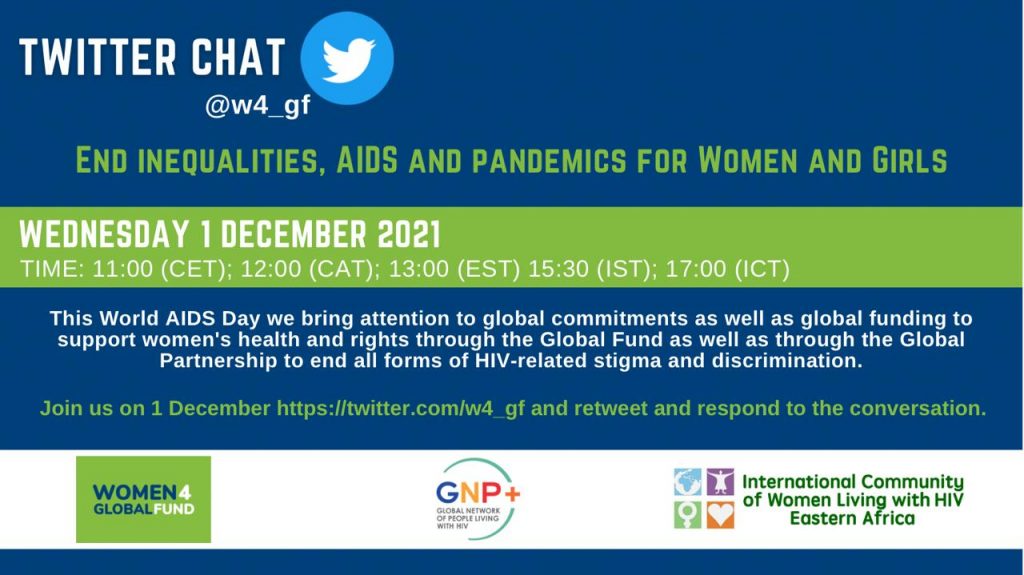This World AIDS Day, Women4GlobalFund (W4GF), the Global Network of People Living with HIV (GNP+), and the International Community of Women Living with HIV Eastern Africa (ICWEA) bring attention to global commitments as well as global funding to support women’s health and rights through the Global Fund as well as through the Global Partnership to Eliminate all forms of HIV-related Stigma and Discrimination (The Global Partnership).
Download this statement.
Join us on twitter on 1 December – see details below
Forty years into this pandemic, HIV still threatens the lives of women and girls. Today, the world is off track from delivering on the shared commitments – not only to end AIDS by 2030 but also to protect the rights of women and girls.
This World AIDS Day we draw attention to the 16 days of activism against gender-based violence which extends from 25 November (the International Day for the Elimination of Violence Against Women) to 10 December (Human Rights Day). Globally one in three women experience some form of violence in their lifetime, and violence exacerbates women’s vulnerability to HIV. Some studies suggest that in high burden HIV-countries of East and Southern Africa, between 25% and 50% of all new HIV-acquisitions amongst women are linked to women’s experiences of intimate partner violence; this is more acute for young women.
This is an even harsher reality for women and girls living with HIV who are criminalised and marginalized. Such is the case for sex workers who experience violence perpetrated by clients or state actors, including law enforcement agencies and transgender women who are at increased vulnerability to HIV linked to the high levels of direct sexual and physical violence. The COVID-19 pandemic has presented a sober reality that responses to date have failed women and girls. We have seen the extent of the pervasive stigma, discrimination, inequality to healthcare, education and livelihoods, the lack of social protection, as well as the blatant violence facing so many women and girls.
The world has now seen the reality that many women live every day. We ask…. when will things change?
The Global Fund’s Results Report 2021 shows how COVID-19 has derailed responses to HIV, TB and malaria but it also indicates progress in that HIV among adolescent girls and young women has dropped by 41% since 2010 in 13 priority countries. However, reports from countries such as South Africa sound an alarm of over 23,000 teenage pregnancies recorded in one province during COVID-19 lockdowns between April 2020 and March 2021. We see a similar picture in Zimbabwe and UN Women shares that safety is not only an issue in developing countries. In Uganda 14,230 girls were abused in 2020. This is a stark reminder that providing health and social services to mitigate the impact of a disease cannot be dissociated from the social issues that define how service provision is designed and the need to provide access to services, support and to attain bodily autonomy.
2021 has been an important year in which we see the dawn of new strategies across the HIV and development sector, including the Global Fund’s new Strategy Fighting Pandemics and Building a Healthier and More Equitable World with a primary goal to end AIDS, TB and malaria; the new UNAIDS Strategy, End Inequalities – End AIDS both of which are said to inform the development of the PEPFAR Strategy: Vision 2025. Also, soon to be finalised are WHO’s new global health sector strategies on HIV, viral hepatitis and sexually transmitted infections 2022-2030.
With these new strategies, we call on the global community to support women and girls who are not safe or free.
Now is the time to ensure that women and girls around the world are free to live full lives irrespective of their HIV status. Ending inequalities requires transformative change. Political, economic and social policies need to protect the rights of all women and devote attention to the needs of communities that are disadvantaged and marginalised. Ending inequalities, HIV-related stigma and discrimination and violence, AIDS and pandemics will not be possible without strong community systems and without placing people and women centred responses – it will not be possible if we do not address gender inequality and systemic patriarchy that continues to drive inequality across many national decision-making platforms.
This World AIDS Day, we call on our global partners to get it right. We call for greater efforts to:
- Rethink how the work is tracked around health equity, gender equality and human rights in the HIV response – we continue to call for qualitative as well as quantitative indicators that track the work around HIV and for the data to be disaggregated by age and gender including other social identities that are essential to track success and can greatly inform future work.
- Ensure women and communities are at the centre of responses – We now need community-led and people-centred infrastructure because we are more than targets to be met.
- Provide community funding steams. We celebrate PEPFAR’s latest draft highlighting “clear evidence of agency progress towards local partner direct funding, including increased funding to key population-led and women-led organizations in support of Global AIDS Strategy targets related to community-, key population-, women-led responses”. We need to see more the Global Fund take the same action.
- Deepen collaborative engagements to evaluate progress across policies on the status of human rights and gender equality.
Join us on twitter at 12 noon (CAT). More details below

